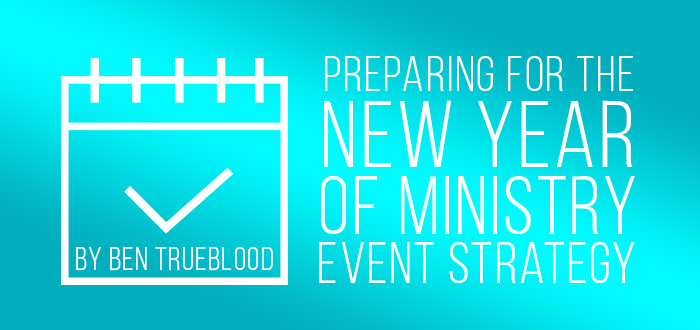The following post was written by Ben Trueblood, Director of Lifeway Student Ministry
I have a love / hate relationship with events in student ministry. There have been times in ministry when I have lived from event to event trying to ride the wave of momentum. There have also been times when I’ve moved into a phase of forsaking events altogether. Both of these unhealthy views are extreme ends of a pendulum that is constantly swinging in the student ministry world. A constant reliance on events to push your student ministry will only lead to fatigue for you, your leaders, and your students. It’s a never-ending treadmill of trying to “beat the previous event.” Forsaking events altogether removes some of the opportunity for students to experience those marker stone moments in their lives that we so often see take place at an event. This view also removes the synergy and unity moments that can be built through events, as well as the general fun and positive atmosphere. Remember, your student ministry should be fun because your students like to have fun. Too often in my own ministries I have been guilty of forgetting that simple truth in pursuit of a “deeper discipleship experience.” You can have both.
Events will always play a role in student ministry. There will always be a place for camps, mission trips, retreats, etc… The problem occurs when they are done without any connection to the strategy and wise discipleship plan you have for your ministry. “Because we did it last year” and “because I need a numbers boost” are never good reasons to have an event.
What makes an event truly special in the life of a student ministry is when it connects with your strategy and your wise discipleship plan. As we approach 2015, take some time to think through your upcoming events. Here are some important questions to ask to make sure that your events are helping you accomplish your ministry goals rather than just wearing you out:
- Why am I doing this event?
- What do I hope to accomplish by doing this event?
- What is my attendance goal for this event?
- How does this event connect with my plan for discipling these students and their families?
- Does this event clearly connect to my ministry strategy and the overall strategy of the church?
- Do my volunteer leaders understand this event’s connection to the strategy and can they articulate it to others?
- Do my students understand this event’s connection to the strategy of the ministry?
- What is my communication plan for parents?
- What is my communication, recruitment, and training plan for volunteer leaders?
- Have I checked local school and event calendars for scheduling conflicts?
- What curriculum am I going to use for this event that supports my discipleship plan and helps me accomplish the event goal?
- Am I going to have a speaker at this event? If so, have I clearly communicated the theme and purpose of the event? Just a side note on this one as someone who speaks at events: be detailed and clear about your theme and purpose. This is your event, not the speaker’s, and the more information the speaker knows the better they will be able to help you accomplish your goals for the event. Again, as this is your event, you should take advantage of the right you have to explain to the speaker where you want them to go.
- What are the “next steps” that students can take when the event is over? Make sure your event flows into something else. This goes back to the purpose question. There should never be just a “stand alone” event with nowhere to go. Events should be part of your discipleship path, not a detour from it.
- How will I evaluate the event when it is over to make sure I capture learnings?
The events that take place in your student ministry can be a valuable piece of your wise discipleship plan. Spending the time to answer these questions will give you a good start in making sure that your events are a strategic component of your ministry rather than something that just makes you tired.
I would love to hear from you on this topic! Leave a comment below with some of the questions or details that you think through to make sure your events are connected to the overall discipleship plan of your ministry.



